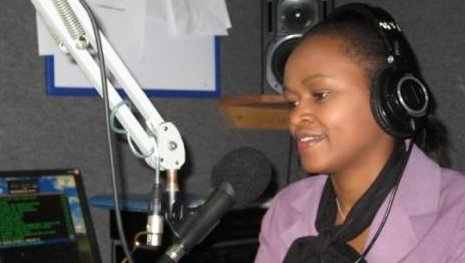It’s almost 11 a.m., and the sun’s heat is already becoming unbearable in Rironi, a village about 50 kilometers from Nairobi, the capital of Kenya. But a group of six men sitting on a roadside bench don’t seem to feel the heat. They are all wearing heavy jackets and scarves. Several motorbikes are parked opposite the bench. About half a meter away, a man in blue overalls is busy repairing a motorbike. He is singing along as a popular Kikuyu tune plays from a small radio that he has placed under a tree. The joint is called Ha Mwaniki, meaning “Mwaniki’s Place” in the language of the Kikuyu tribe. The men’s animated talk comes to a sudden stop as a booming voice announces the day’s top news in Kikuyu. One of the major news items is the result of an opinion poll on the popularity of presidential candidates ahead of the March 4 general elections. Immediately after the newscast, the men debate whether results of opinion polls reflect the situation on the ground. “How come the research companies have never interviewed me or anyone I know?” asks Peter Mwaniki, the mechanic, as he raises his head from the bike he has been working on. “I cannot trust them.” The radio is the main source of news for Mwaniki and his customers. They say their preferred station is Inooro FM, which broadcasts in the Kikuyu language all over the country. They say they can’t afford to buy newspapers every day and have no time to watch TV, so they have to rely on the small radios they carry to stay updated. Witnesses blame community radio stations for fanning ethnic violence following disputed results in Kenya’s 2007 presidential election. World Radio Day workshops highlight trainings by international and national agencies to promote fair and balanced coverage to avoid similar violence in the coming March elections. Although some radio journalists and presenters who have participated in the trainings emphasize objective broadcasting, officials say others haven’t learned their lesson. Radio is the most popular and accessible medium of mass communication in Kenya, according to the Media Council of Kenya, a statutory body that regulates media and the conduct of journalists in the country. According to the council, 95 percent of all Kenyans listen regularly to the radio. There are about 96 licensed FM radio stations, according to the Communications Commission of Kenya, the government body that licenses all systems and services in the communications industry, including broadcasting. Of these, 30 broadcast in vernacular languages. Witnesses accused vernacular radio stations of broadcasting hateful remarks to fan ethnic violence following Kenya’s 2007 presidential election, according to the Commission of Inquiry on Post-Election Violence. The commission was formed in 2008 to investigate the ethnic clashes in various parts of the country following disputed election results. “Many recalled with horror, fear and disgust the negative and inflammatory role of vernacular radio stations in their testimony and statements to the Commission,” according to the commission’s report. The violence killed 1,300 people, according to the Kenya Red Cross Society. More than 350,000 people were displaced.
Advertisement















